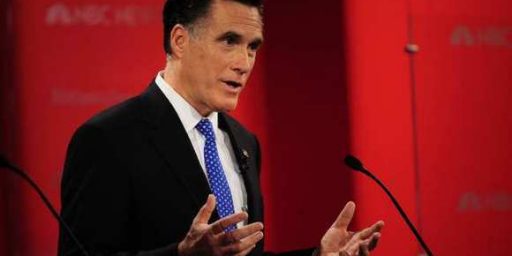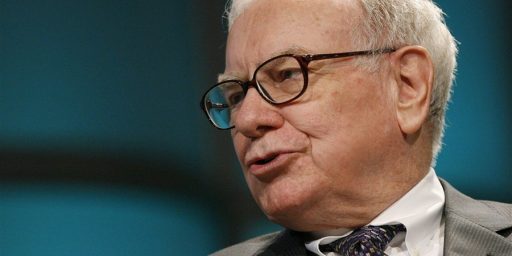Taxing the Rich
Ben Stein, he of “Ferris Bueller” and “Win Ben Stein’s Money” fame, had a meeting with mega-billionaire Warren Buffett and came away thinking that we should tax rich people more.
Mr. Buffett compiled a data sheet of the men and women who work in his office. He had each of them make a fraction; the numerator was how much they paid in federal income tax and in payroll taxes for Social Security and Medicare, and the denominator was their taxable income. The people in his office were mostly secretaries and clerks, though not all.
It turned out that Mr. Buffett, with immense income from dividends and capital gains, paid far, far less as a fraction of his income than the secretaries or the clerks or anyone else in his office. Further, in conversation it came up that Mr. Buffett doesn’t use any tax planning at all. He just pays as the Internal Revenue Code requires. “How can this be fair?” he asked of how little he pays relative to his employees. “How can this be right?”
Discussions of raising taxes on the rich always bring to mind the classic couplet, “Tax the rich, feed the poor / Till there are no rich no more” from “I’d Love to Change the World,” by Ten Years After.
Jonah Goldberg‘s right that increasing taxes on the rich won’t end the federal budget deficit, as Stein seems to imply.
Still, it makes no sense for Buffett to pay a smaller chunk of his income than do his employees. My guess is that this is happening only because he’s giving oodles of it away to charity or because his capital gains are being turned over and thus aren’t “income” in any meaningful sense.
Goldberg calls for “a Reagan style tax reform that closes silly loopholes, credits and gimmicks. The net result would be a tax increase on the wealthiest, but it would also get the government, albeit temporarily and modestly, out of the business of distorting the economy.” That’s my preference as well. Ideally, I’d prefer a consumption based, rather than an income based, system with some exclusions for foodstuffs, medicine, and shelter. There seems to be little impetus in that direction, however.
UPDATE: Russell Newquist has a detailed post entitled “How the Rich (Don’t) Pay Taxes” detailing how Buffett’s calculus came to be.
Interestingly, conservatives have been arguing for a flat tax and other alternatives to our present system as long as I can remember while liberals/progressives have argued for tweaking our current system to make it more progressive. It would seem that the conservative plans would achieve that objective far more readily and simply.






As TCSDaily once pointed out, the Treasury Department accepts general donations, and has been in 1843. So anyone like Buffet who feels they are not being sufficiently taxed merely has to write a check payable to the “United States Treasury” and mail it to:
Gifts to the United States
U.S. Department of the Treasury
Credit Accounting Branch
3700 East-West Highway, Room 6D37
Hyattsville, MD 20782
In the mean time, please stop trying to spend MY money because you feel guilty about YOUR wealth.
Such a consumption-based tax would make things even worse for the comparison between Mr. Buffett and his workers.
If he’s getting everything in cap gains, it make sense that he’d be paying less. It’s a flat 15 and he doesn’t pay payroll taxes.
Just to add to what Stormy wrote above, I would like to hear from Mr. Buffet why he chose to let Bill Gates dispense some of his extra wealth rather than letting the US Government do so.
James,
Ideally, I’d prefer a consumption based, rather than an income based, system with some exclusions for foodstuffs, medicine, and shelter.
I would be willing to see figures on that, if you agreed that all methods of stopping money “going around” and thus helping to generate true, tangible wealth – which at the end of the day is money’s only function – were “consumption”. In other words, moving money to offshore holes, corporate tax loopholes, trusts etc. get taxed as if all that money were “consumption” now.
“From each according to their means, to each according to their needs” still seems like a self-evidently ethical way to run a society, to me. Obviously, it does to Buffett too. He’s also against repeal of the inheritance tax, saying “I want my kids to have enough to do anything they want, except do nothing.” Sensible father.
Regards, C
I would also guess that he is including social security taxes for his employees. That’s not necessarily wrong, but it is separate from the tax code.
As for him not doing any tax planning, that is completely absurd. He is a numbers guy and certainly considers the tax implications of any transaction. It might not be complex off shore trusts, but it’s still tax planning.
Regardless, the U.S. Treasury is better off from Buffet paying 5% than the rest of us paying 40%. The man isn’t doing me any harm, he’s contributing a great deal more. Thanks Warren.
The morality of Lenin and Mao anyway.
I’ll second the comment about social security.
SS is capped at something like $93K of income (I can never keep up – it goes up every year). So at Buffet’s level, his SS “tax” is a tiny fraction of his income. For his worker bees it is the standard 6% (not including the “employer half”).
I would also argue that lumping ordinary income with other types of income is incorrect. Right or wrong, the government classifies income differently depending on how it is “earned” (capital gains vs. ordinary income vs. royalties are all taxed differently).
Did he include state income tax? If so, how much of Buffet’s portfolio is in tax-free muni bonds?
This is one of those apples and oranges comparisons and is ridiculous on its face.
I’ll second the comment about social security.
I’ll third it, and add a reminder that as federal taxes go down, state & local taxes tend to go up. Because certain services and standards (police, fire, garbage, social serviecs, road maintenance, etc, etc) have become such basic assumptions of a ‘modern’ society, they _must_ be continued, and every dollar the Fed doesn’t supply to those ends will come from the taxpayers’ collective wallets via some other route. Buffett makes no mention of that in his calculations…
This is one of those apples and oranges comparisons and is ridiculous on its face.
A comparison of what percentage of their total income people at different income levels pay in total taxes is hardly ridiculous on its face. Who cares if it is capital gains, dividends or “ordinary income”?
What is truly ridiculous, as Stein points out, is that it is very likely some of Mr. Buffet’s workers pay a higher percentage of their income in taxes than he does.
One of Mr. Buffet’s accountants with a $93,000 salary will pay 6% in payroll taxes on his entire salary and also pay about a quarter of his salary in income taxes. He’s so lucky he even gets to pay income taxes on the payroll taxes he had to pay. This guy will pay about a third of his total income in taxes.
Mr. Buffet could make a billion dollars in cap gains and dividend income and pay a flat 15%. Seems a little unfair, doesn’t it?
When asked why he wanted to tax rich people, the Democrat said, “Because that’s where the money is.”
(You may have heard a corrupted version of this anecdote.)
I find it incredible that this is even being discussed. He pays less of a fraction of his income than his workers. But what if his less of a fraction is $50 million in real money and one of his workers larger fraction is $2000 in real money.
Instead of taking a small percentage of rich people’s money, let’s take a BIG percentage like 100 percent. It’s not like they’ve earned it or anything. That way everyone can have lots of money, except the ones that make lots of money, of course.
/sarcasm
Thanks, Bandit and Spacemonkey for that succinct analysis. /sarcasm.
Stein writes:
Now, can either of you give a rational explanation of why the richest shouldn’t pay the same fraction of their earnings in taxes as the rest of us? I mean without invoking a kneejerk conservative-economics version of Godwin’s Law and sputtering incoherently “b-b-but that’s communism!”
A move to ensure the richest pay the same fraction as the rest of us simply seems a fairer way and is perfectly in accord with “from each according to their means”, or if you prefer it in JFK’s words: “For of those to whom much is given, much is required.” In fact, even after paying, their means in real terms will still be higher than you or I can boast.
Regards, Cernig
Depends on how much of his income he spend. Further, some of his workers might not pay any income tax depending on which consumption tax plan we are talking about.
Further, a consumption tax is very much like a luxury tax. If Buffet goes out an buys a $90,000 he could end up paying an extra $20,700 in consumption taxes (using the Fair Tax). I doubt many of his workers would pay something like that.
Moreover, a consumption tax with a large exemption/rebate would make the tax progressive, and hence more fair.
Sure, but its Hell on incentives.
And also a highly regressive tax as well, which would bias the numbers in Buffets favor (for his point). Hence it should either be pointed out, or removed from the calculations, IMO.
Uhhh, Cernig, you were the one who did that. And the Fair Tax would, at least in theory, assure that the tax system is more fair, hence the name.
Well, I’m not even going to be a serious player in this discussion, because I don’t see why a guy making $1M a year shouldn’t pay 45% of his income rather than the 40% paid by someone who makes $100,000 a year. (Percentages imaginary for sake of discussion.)
Someone like Buffett can plainly afford to pay, not the *same* % his secretaries do, but a larger percentage.
fairer to whom? Someone having their earnings extorted by the gov’t? You can throw all the snark you want but all you’re saying is what every other greedy little thief says – it’s yours and I want it. Spare me the bs about ethics – I go every Sunday and donate to the poor and it’s my choice – it’s not gov’ts – and spare me the bs about the common good – if you look at the trillions of dollars spent in this country and around the world it seems like very little good has come from it. Sorry – little thieves always have their eyes on what other people have so they can steal it. Then lie about how it’s for those in need.
Bandit,
Worried the government is going to take away your slaves? Those damned liberals.
But to clarify the discussion, the story isn’t that Buffet is being taxed less, but that he has a larger percentage of untaxed income that his lower-paid staff. So to fix the tax system and make it “Fair”, we just have to make everyone pay the same rate for the same fraction of income.
A consumption tax would be even less fair, because lower and much of the middle class consume just about all of their income, while upper and upper-middle class families will not.
A consumption tax with exceptions on “necessities” is likely to either misrepresent necessities (is a car a necessity?) or not tax the lower-middle classes at all.
Now for the quotable quotes:
Bandit: “The morality of Lenin and Mao anyway.”. No, the morality of Marx. Lenin used Communism as a tool to gain power, as did Mao though he seemed to believe in it more than Lenin.
Steve V.: “And the Fair Tax would, at least in theory, assure that the tax system is more fair, hence the name.”. That one literally made me laugh. If only we could fix the system by giving bills sufficiently benevolent names. I am in favor of the “World Peace” bill, judging by the name I’m sure it’ll work.
“Mr. Buffett doesn’t use any tax planning”
LOL! What a riot! He apparently had fooled everybody about that! LOL!!!
And Anderson, I was unsure of how lacking in intelligence you were, till you wrote something on the matter and showed me: you are very lacking. Go back and take basic economics and tax accounting 101. (which should be a requirement for all liberals)
And to kill what 50 – 100 million people along the way? Spare me the bs about morality or ethics – it’s just greed.
Go back and take basic economics and tax accounting 101.
I’m an accountant. I didn’t see anything objectionable in what Anderson said. Perhaps you could expand on your comment.
I don’t see the validity of the argument that just because someone can afford to pay more that they should pay more. You could take all but say $100 million from Gates and he would be fine in terms of life style. But that is neither right nor smart. The result would be to transfer resources from someone very talented, hard working and risk taking to: the government. Is that a good trade? Who will create more and better jobs, Gates or the government?
Instead of worring about people that are a considerable benefit to society regardless if they paid a dime in tax, maybe we should be annoyed with folks who never create anything, or in the case of criminals, destroy.
Another consideration is age. Someone not paying much is tax at age 25 isn’t a big deal. But if your 45 and not contributing, that’s pathetic.
jpe: you are an accountant? Wow. (CPA? Or self-appointed? Self-taught?)
Well, perhaps you can tell us then why it is that Warren “Jimmy” Buffett, who is singing the praises of higher taxes on himself and others like him, actually ends up paying a lower rate of taxes than the women who gets him coffee in the morning. Why would this be, especially if he should supposedly be in the highest tax bracket? As an accountant (if you really are one-sorry don’t mean to doubt you) you would be able to take a very short amount of time and explain why this is so and what the simple reasoning is behind it (of course, you would then end up supporting the conservative republican point of view).
From the update to the original post:
“conservatives have been arguing for a flat tax and other alternatives to our present system as long as I can remember while liberals/progressives have argued for tweaking our current system to make it more progressive. It would seem that the conservative plans would achieve that objective far more readily and simply. ”
Huh? Let me get that straight. To eliminate the last vestiges of progressiveism in our tax brackets would make the system more progressive.
Hmmm. Perhaps you are actually referring to all the other aspects of “The Flat Tax” (TM), aside from the flatness? There is, of course, no reason why we couldnt have tax simplification, to the max, while keeping the progressive bracketing. And you might find liberals amenable to much of that.
You beat me to it, Tano. Amen. 🙂
Gee, Tano. Your plan about the flat tax is great in every respect. Except of course for the flatness!
You liberals crack me up! Always kidding around-oh wait…you weren’t serious were you?
Anderson: “I don’t see why a guy making $1M a year shouldn’t pay 45% of his income rather than the 40% paid by someone who makes $100,000 a year.”
Given that we have a standard deduction that is fixed, there should be progressivity built into the system even without graduated brackets. The problem is that we have tweaked the code thousands of times to incentivize certain kinds of spending and discourage other kinds.
At the margins, though, brackets have a problem that Ronald Reagan pointed out 25 years ago: Getting a small raise, even one that merely keeps up with inflation, can push a person into the next bracket and wind up being a huge pay cut.
For that matter, it’s unfair even in a static arrangement. Let’s say people making $75,001 to $100,000 pay 25% and those making $100,001 to $250,000 pay 30%. The people at the low end of the second bracket will pay far more than those at the high end of the first, even though their incomes are virtually identical. Indeed, they will perversely do that while actually bringing home less money than those in the “lower” bracket.
Steve V : Nope, Bandit brought up Mao and Lenin. I just brought up a well-known maxim that is centuries old. Marx used a version of it, yes, but Marx almost certainly stole it from the Torah (Temple tithe rules) or from Christian socialism.
Bandit, you can prove anything from scripture:
Interestingly, the guy who wrote the Pledge of Allegiance has been described as a Christian Socialist. Tony Blair is another.
Regards, C
Michael,
Well, the criterion for fairness in this discussion is that the rich pay the same or more, in percentage terms, than the non-rich. The Fair Tax does that. As for the name, well that is how bills are usually named. It is rare to see a bill/piece of legislation entitled, “The Claims are this Bill Will Help, but in the End It Will Really Fuck You Over.”
With a large standard deduction/rebat this is not the case.
Tano,
Paradoxically, yes because as Russell Newquist has shown the current tax code is actually quite regressive.
Sure, you could keep tinkering with the current system, but you’d be unlikely to make the taxes progressive. The payroll tax is one main culprit here. After a certain point you don’t pay anymore on that, and unearned income doesn’t pay any at all. Then capital gains is another, and when the investment is long term it is taxed at a flat rate.
As for why we can’t get simplifcation that is because the tax preparation industry is very large and very powerful. Most of us call them lawyers (and accountants). Given that lawyers also make most of the House of Representatives and the Senate, don’t expect much change anytime soon.
And a flat rate tax with a decent sized deduction/exemption/rebate can make a flat tax progressive in the sense of tax paid as a percentage of income.
Technically, bracket creep has been reduced nowadays by indexing the brackets to inflation. It may not be perfect, but it has helped.
Still, a small raise for some people, in real terms, can push them into a higher bracket where that small raise becomes virtually meaningless. That is suppose you get a $1,000 raise and it puts that $1,000 in the 25% catagory. Now after (income) taxes you only get $750. Then we have to take off the payroll tax which reduces that number to $659. Suddenly that raise is looking alot smaller, so much so that one might not want to take it if it means extra work (i.e. there is a labor/leisure trade off). This is how the marginal tax rate can adversely effect things like work effort.
Technically, they would only pay 30% on the $149,999 ($245,000 – $100,001). This makes calculating tax percentages rather difficult. For example, the person who makes say $80,000 will pay 22.9% of his income in federal taxes. Somebody making $100,000 (note that both individuals are in the same top marginal tax bracket) will pay 24.9% of his income in federal taxes. If we add on payroll taxes then the percentages are 32% and 34% respectively.
No, it isn’t that bad. I took a person making $30,650 and compared him to somebody making $30,652 and the respective federal tax rates (as a percentage of income) are 13.7679%
13.7688% respectively. The differences in taxes paid is $0.28. Now, in terms of the last dollar earned it is true that the person earning more is paying taxes that are almost double even though the incomes are virtually identical. But that is more a function of the lack of “smoothness” in the tax rates.
Cernig,
Sorry Cernig, Bandit was merely pointing out that your “from each according to his means, to each according to his needs” was basically Karl Marx’s notion of what is a just system…which was later picked up by Mao and Lenin. So, no, technically you brought up communism/marxism first.
Another thing that Buffet and Stein miss is the deadweight loss associated with the income tax. Tax preperation sucks up massive amounts of resources. Every hour you spent is “lost”, buying Turbo Tax are “lost resources”, and so on. Not to mention the adverse impact on work effort I noted above. Then there is the disincentive to save as well given that savings are taxed at the same rate as earned income even though it is unearned income (like much of Buffet’s).
James writes,
“At the margins, though, brackets have a problem that Ronald Reagan pointed out 25 years ago: Getting a small raise, even one that merely keeps up with inflation, can push a person into the next bracket and wind up being a huge pay cut.”
huh? The brackets define marginal rates. Getting a raise that “pushes you into a higher bracket” means that only part of your raise, not your whole salary, gets taxed at the higher rate. How can that equate to a pay cut?
Steve,
In your long reply, you seemed to respond to some of my points, but I dont see that you really have. I was not calling for minor tweaks to the system. I was postulating that one could implement the full scope of “The Flat Tax (TM)”, i.e. all the simplification, and whatever else is entialed regarding payroll taxes etc., but still have progressive brackets, instead of just two (0% and 17% or whatever it is).
I understand that the flat tax is actually somewhat progressive, since with a 0% bracket, ones overall rate of taxation will go up from 0% to asymptote at the flat rate, with increasing income. Putting a few more brackets in there (and yes, the highest marginal rate would be higher than 17%) would not undermine or detract from the rest of the reform.
My problem with this is that I don’t think it would help for very long. It is kind of a “keep it simple, stupid” thing. With the brackets and such I think you’d have more pressure to change things later on that have lead to the mess we have now. Also, a progressive system is harder for people to determine what impact taxes are having on them or will have on them. The examples I did took several minutes to do and I didn’t mess around with deductions (itemized or standard) and what not (so to get the actual income for those examples you’d have to add some back, that some being a variable amount depending on the situation in question). In short, you can see how the tax code now is horribly, horribly complex.
My preferred outcome a simple single rate tax with a large standard deduction. Simple, easy to calculate and much less deadweight loss. Further, Ben Stein would be happy.
This is way late, so no one will read it, but whatever. I’m primarily an auditor, but I’ve done my fair share of 1040s. At any rate, as James’s link points out, if Buffet’s earned income is dwarfed by his cap gains, which they probably are, the bulk of his income is taxed at 15%. Pretty simple.
Steve,
huh? You seem to be trying valiently to make my proposal more complex than it is. Fill out your return on the back of a postcard (gee, how quaint – postcards 🙂 ). Enter income, look it up in table. Enter tax. Sign.
That, as opposed to: Enter income, multiply by taxrate. Enter tax. Sign.
I hardly think that the first example is somehow equivalent to our current system.
Sorry but no. It would look more like this:
[I(1) – 0]*t1 + [I(2) – I(1) – 1]*t2 + [I(3) – I(2) – 1]*t3 + [I(4) – I(3) – 1]*t4 + [I(5) – I(4) – 1]*t5 +…+[I(n) – I(n-1) – 1]*tn = Your Tax.
Where I(k) is the income cut off for the t(k) tax rate. Depending on how many tiers/marginal rates you want it could be pretty complex. Along with the proviso that t(i+1) > t(i) for your progressivity.
It isn’t me making your preferred tax code complex, you did…by wanting a tax system with progressively higher marginal rates. Oh and as I noted, the above doesn’t include any kinds of deductions. That is another way for the politicians to make things complicated and indirectly subsidize various forms of behavior.